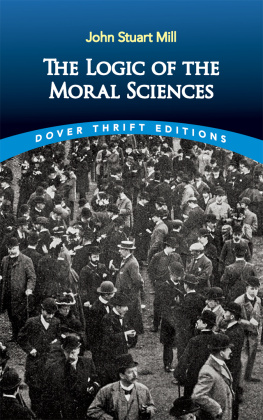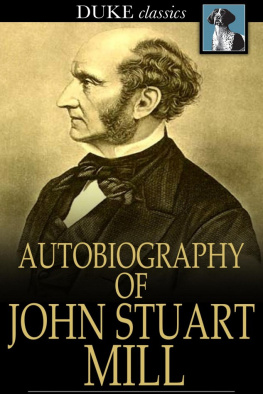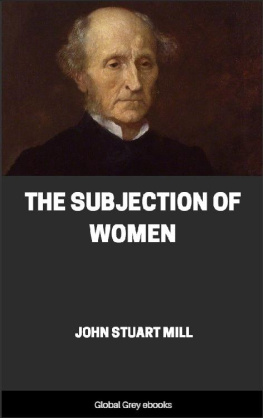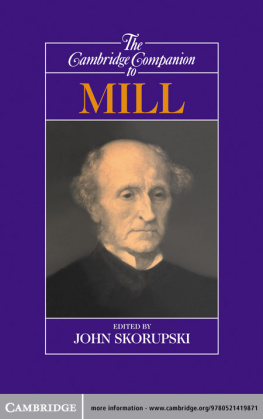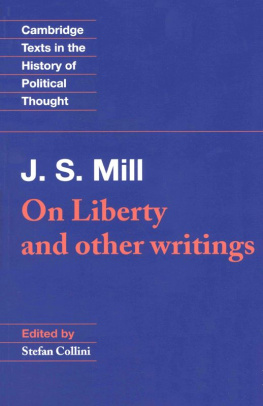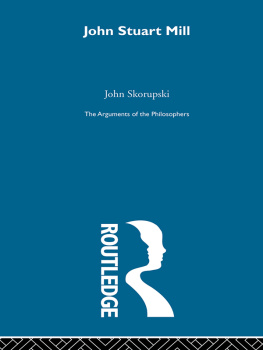Mill John Stuart - The Logic of the Moral Sciences
Here you can read online Mill John Stuart - The Logic of the Moral Sciences full text of the book (entire story) in english for free. Download pdf and epub, get meaning, cover and reviews about this ebook. year: 2020, publisher: Dover Publications, genre: Science. Description of the work, (preface) as well as reviews are available. Best literature library LitArk.com created for fans of good reading and offers a wide selection of genres:
Romance novel
Science fiction
Adventure
Detective
Science
History
Home and family
Prose
Art
Politics
Computer
Non-fiction
Religion
Business
Children
Humor
Choose a favorite category and find really read worthwhile books. Enjoy immersion in the world of imagination, feel the emotions of the characters or learn something new for yourself, make an fascinating discovery.
- Book:The Logic of the Moral Sciences
- Author:
- Publisher:Dover Publications
- Genre:
- Year:2020
- Rating:4 / 5
- Favourites:Add to favourites
- Your mark:
- 80
- 1
- 2
- 3
- 4
- 5
The Logic of the Moral Sciences: summary, description and annotation
We offer to read an annotation, description, summary or preface (depends on what the author of the book "The Logic of the Moral Sciences" wrote himself). If you haven't found the necessary information about the book — write in the comments, we will try to find it.
The Logic of the Moral Sciences — read online for free the complete book (whole text) full work
Below is the text of the book, divided by pages. System saving the place of the last page read, allows you to conveniently read the book "The Logic of the Moral Sciences" online for free, without having to search again every time where you left off. Put a bookmark, and you can go to the page where you finished reading at any time.
Font size:
Interval:
Bookmark:

DOVER THRIFT EDITIONS
GENERAL EDITOR: SUSAN L. RATTINER
EDITOR OF THIS VOLUME: TERRI ANN GEUS
Copyright
Copyright 2020 by Dover Publications, Inc.
All rights reserved.
Bibliographical Note
This Dover edition, first published in 2020, is an unabridged republication of the work originally published as Book VI. On the Logic of the Moral Sciences in John Stuart Mills A System of Logic, Ratiocinative and Inductive, 8th edition, by Longmans, Green, Reader, and Dyer, London, in 1872. A new Note has been specially prepared for this edition.
Library of Congress Cataloging-in-Publication Data
Names: Mill, John Stuart, 18061873, author.
Title: The logic of the moral sciences / John Stuart Mill.
Other titles: On the logic of the moral sciences
Description: Dover edition. | Mineola, New York: Dover Publications, Inc., 2020. | Originally published as Book VI. On the Logic of the Moral Sciences in John Stuart Mills A System of Logic, Ratiocinative and Inductive, 8th edition, by Longmans, Green, Reader, and Dyer, London, in 1872. A new Note has been specially prepared for this edition.
Identifiers: LCCN 2019045246 | ISBN 9780486841977 (paperback)
Subjects: LCSH: Ethics. | Logic.
Classification: LCC B1603 .05 2020 | DDC 170dc23
LC record available at https://lccn.loc.gov/2019045246
Manufactured in the United States by LSC Communications
84197901
www.doverpublications.com
2 4 6 8 10 9 7 5 3 1
2020
Note
JOHN STUART MILL (18061873) was a British philosopher and the oldest son of philosopher and historian James Mill. The young Mill, fluent in Greek and Latin by age ten, was a precocious child, wholly immersed in the rigorous teachings of his father. Before the age of twenty, he had attained an academic maturity that far exceeded that of his peers. With his extensive knowledge of the Greek philosophers, Mill was an early master in the art of rhetoric. This early enrichment provided Mill with a solid background, enabling him to question widely held views on pertinent issues.
Though Mill spent his entire professional career of thirty-five years at the service of the British East India Company in London, he is remembered most for his influence in such fields as politics, economics, philosophy, and religion, and as a crusader for gender equality. In 1824, at the age of eighteen, he wrote an article in the Westminster Review detailing the inconsistencies that existed in the moral standard for women and men. His major writings include A System of Logic (1843), Essays on Some Unsettled Questions of Political Economy (1844), Principles of Political Economy (1848), On Liberty (1859), Considerations on Representative Government (1861), Utilitarianism (1863), and The Subjection of Women (1869). His famous Autobiography was published posthumously in 1873. In his Autobiography, Mills says this about his System of Logic: I... did not expect that the book would have many readers, or approvers; and looked for little practical effect from it, save that of keeping the tradition unbroken of what I thought a better philosophy.
Reprinted here is Book VI of Mills A System of Logic, Ratiocinative and Inductive, 8th edition. Despite Mills reputation as a humble, practical man with strong ideas about right and wrong, he has been called the most influential English-speaking philosopher of the nineteenth century.
Contents
CHAPTER
THE LOGIC OF THE MORAL SCIENCES
SI LHOMME PEUT prdire, avec une assurance presque entire, les phnomnes dont il connat les lois; si lors mme quelles lui sont inconnues, il peut, daprs lexprience, prvoir avec une grande probabilit les vnemens de lavenir; pourquoi regarderait-on comme une entreprise chimrique, celle de tracer avec quelque vraisemblance le tableau des destines futures de lespce humaine, daprs les rsultats de son histoire? Le seul fondement de croyance dans les sciences naturelles, est cette ide, que les lois gnrates, connues ou ignores, qui rglent les phnomnes de lunivers, sont ncessaires et constantes; et par quelle raison ce principe serait-il moins vrai pour le dveloppement des facults intellectuelles et morales de lhomme, que pour les autres oprations de la nature? Enfin, puisque des opinions formes daprs lexprience... sont la seule rgle de la conduite des hommes les plus sages, pourquoi interdirait-on au philosophe dappuyer ses conjectures sur cette mme base, pourvu quil ne leur attribue pas une certitude suprieure celle qui peut natre du nombre, de la constance, de lexactitude des observations?
Condorcet, Esquisse dun Tableau Historique des Progrs de lEsprit Humain.
If man can predict, with almost total confidence, phenomena whose laws he knows, and if, even when they are unknown to him, he can foresee future events with a general probability from experience, why should it be thought fanciful to attempt a sketch of mans future on the evidence of his past? In the natural sciences the only basis of belief is the idea that the general laws, known or unknown, which control the phenomena of the universe are necessary and constant; and why should this principle be any less true for the other workings of nature? Finally, since opinions formed from experience... are the sole rule of conduct of the wise, why should we not allow the philosopher to base his conjectures on the same foundation, provided that he does not attribute to them a certainty greater than can arise from the number, constancy and accuracy of the observations? (tr. by Colin Haycraft)
CHAPTER I
Introductory Remarks
1 . The backward state of the moral sciences can only be remedied by applying to them the methods of physical science, duly extended and generalised
Principles of Evidence and Theories of Method are not to be constructed priori. The laws of our rational faculty, like those of every other natural agency, are only learnt by seeing the agent at work. The earlier achievements of science were made without the conscious observance of any Scientific Method; and we should never have known by what process truth is to be ascertained if we had not previously ascertained many truths. But it was only the easier problems which could be thus resolved; natural sagacity, when it tried its strength against the more difficult ones, either failed altogether, or if it succeeded here and there in obtaining a solution, had no sure means of convincing others that its solution was correct. In scientific investigation, as in all other works of human skill, the way of obtaining the end is seen as it were instinctively by superior minds in some comparatively simple case, and is then, by judicious generalisation, adapted to the variety of complex cases. We learn to do a thing in difficult circumstances by attending to the manner in which we have spontaneously done the same thing in easier ones.
This truth is exemplified by the history of the various branches of knowledge which have successively, in the ascending order of their complication, assumed the character of sciences; and will doubtless receive fresh confirmation from those of which the final scientific constitution is yet to come, and which are still abandoned to the uncertainties of vague and popular discussion. Although several other sciences have emerged from this state at a comparatively recent date, none now remain in it except those which relate to man himself, the most complex and most difficult subject of study on which the human mind can be engaged.
Next pageFont size:
Interval:
Bookmark:
Similar books «The Logic of the Moral Sciences»
Look at similar books to The Logic of the Moral Sciences. We have selected literature similar in name and meaning in the hope of providing readers with more options to find new, interesting, not yet read works.
Discussion, reviews of the book The Logic of the Moral Sciences and just readers' own opinions. Leave your comments, write what you think about the work, its meaning or the main characters. Specify what exactly you liked and what you didn't like, and why you think so.

